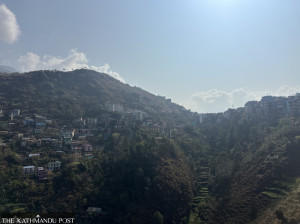Karnali Province
Authorities fail to contain influenza in Humla
Continuous snowfall, human resource crunch and lack of viral transport medium are making it difficult to contain the disease, a week after it broke out.Arjun Poudel
Even a week after a deadly outbreak of influenza-like ailments in Kharpurnath Rural Municipality of Humla district, concerned health authorities of the district and Karnali Province have failed to collect specimens of the infected people.
A 36-year-old woman died of seasonal influenza on Monday night, and people of the entire rural municipality have been affected by influenza-like ailments.
"We do not have viral transport medium to collect throat swab and other specimens of the affected people," Dr Tashi Lama, chief of Humla District Hospital, told the Post over the phone from Surkhet, the headquarters of Karnali Province. "We have not been able to reach the affected villages due to continuous snowfall in the area."
Viral transport medium is a system suitable for the collection, transportation, maintenance and long-term freeze storage of clinical specimens.
Of the eight posts of doctors in the district hospital, only two doctors, including Lama, are serving.
Lama said that around 70 patients are visiting the hospital's outpatient department every day, and most of the patients complain of influenza and cold-related ailments.
In April last year, 10 people had died from influenza-like ailments in Humla.
"It’s diarrhoea during the monsoon and influenza and cold-related diseases during the winter in the district every year,” said Lama. "We have informed the Provincial Health Directorate about the manpower crunch and the prevalence of the diseases."
Shyam Acharya, a focal person at the Provincial Health Directorate of Karnali Province, said that he had asked Lama to collect the viral transport medium from his office and reach the district immediately.
"He told me that he has not been able to return to Humla due to cancellation of flights," said Acharya. "I have asked him to return to the district at the earliest and send samples to the National Public Health Laboratory in Kathmandu for tests."
According to Acharya, his office is in touch with health workers serving in the affected villages. “They told me the situation is under control,” said Acharya.
A report of the Prevalence of Selected Chronic Non-communicable Diseases in Nepal, which was recently carried out by Nepal Health Research Council, shows that 25.1 percent of the population in the Karnali region (one in every four) suffer from chronic obstructive pulmonary diseases. The rate is the highest across the country.
The study shows over three million people across the country suffer from respiratory problems, but only three percent of them have been receiving proper treatment.




 14.24°C Kathmandu
14.24°C Kathmandu













